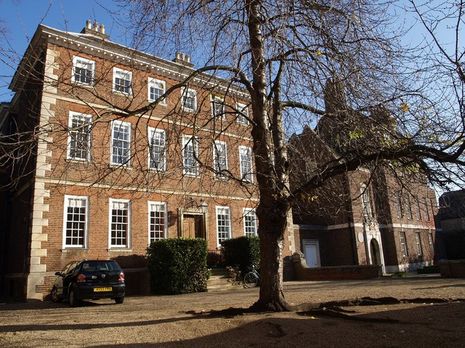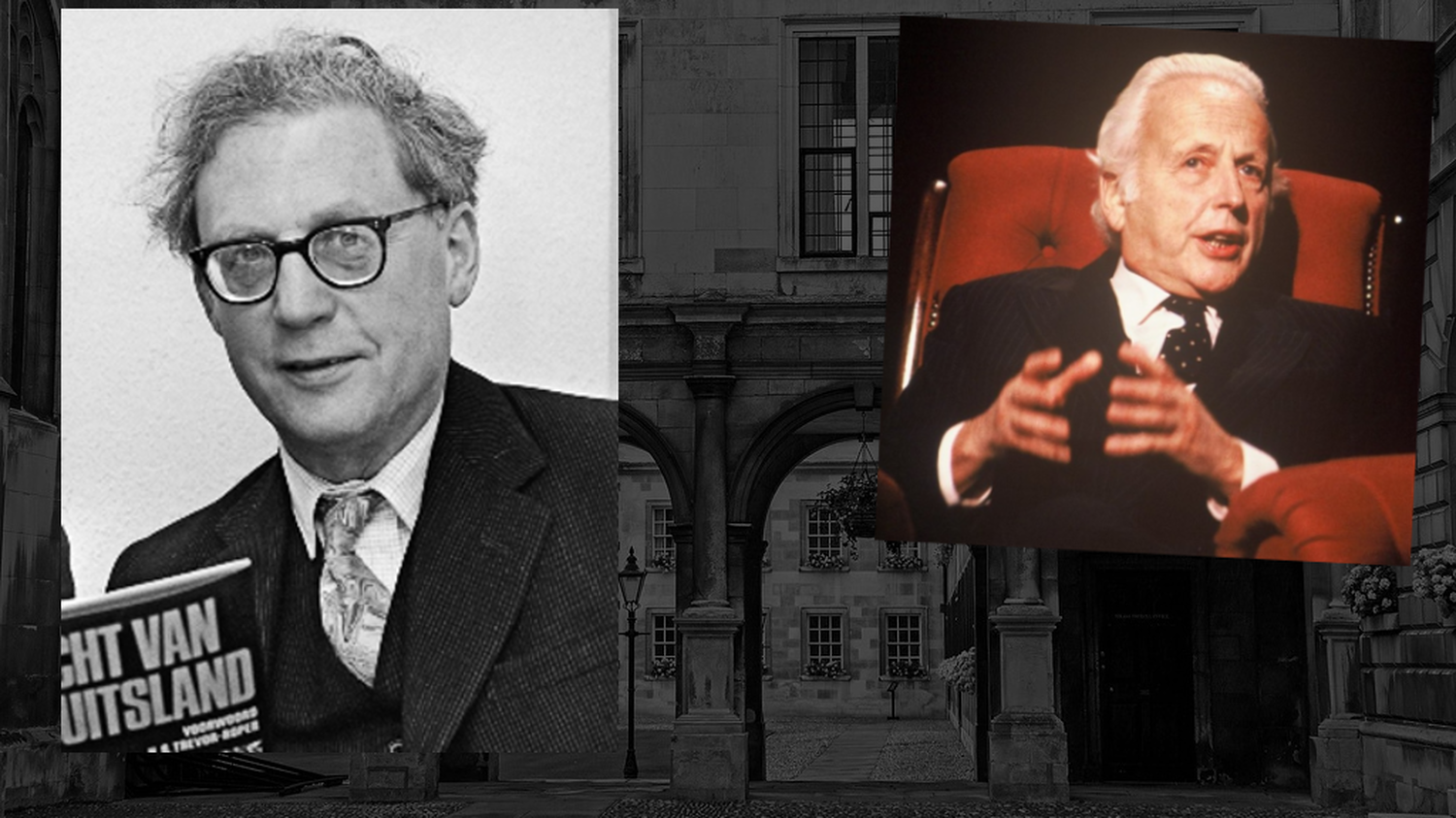“Cambridge just isn’t the place it was.” So begins an article published in this newspaper from Easter term 1969 titled “Cambridge in the Sixties”. The piece asked how to explain “the new seriousness of the undergraduate, the feature most obvious to outsiders and dons alike?” The article also implied that a sort of escapism emerged, evidenced by the formation of new drinking societies, for example. All of this added new layers to one’s experience at Cambridge.
Indeed, what we might call ancien Cambridge – bachelor dons peddling down Trumpington or Mill Lane in tweed suits and gowns by day, fine wine from the cellars at high table by night – had started to fade away after the sixties. Liberty and equality roughly capture the spirit of the times; and the University gradually opened up to those once excluded, including more state-educated students and women. In resistance to all this, however, was one college: Peterhouse.
“Scratch a liberal and you’ll find a fascist” was the line of Maurice Cowling, a fellow at the College between 1963-93 and ringleader of less than a dozen anti-liberal bachelor dons, the vast majority of whom were historians. Cowling and his acolytes had controlled Peterhouse since the late 1960s, manipulating the election of fellows, favouring conservatives and Marxists (to Cowling, “anti-prigs”), intellectually rigorous but also requiring Cowling’s approving sneer – “aaah, he’s evil”.
Supervisions took place after dinner and involved a lot of whiskey, served in a glass ‘half the size of a fishbowl’
By 1980 Cowling had reached the zenith of his power, making sure his candidate was chosen as the next master. His candidate was the historian Hugh Trevor-Roper (Lord Dacre), an Oxford don to the core who would come to look down on the pre-enlightened minds of Peterhouse and its historians. But when chosen he was Cowling’s man. Not only was Dacre one of the most eminent historians in the country, he was a Tory; and Cowling vetted him assuming he would keep Peterhouse immune from any radical change.
It would be a gross reduction to assume that Cowling was a mere reactionary, however, for he was a serious thinker. As a supervisor he was eccentric and inspiring, winning the admiration of undergraduates on the left and right. One former student, then a Trotskyite, told me “he was the greatest mind [he] came across” during his time at Cambridge.
Supervisions took place after dinner and involved a lot of whiskey, served in a glass “half the size of a fishbowl”. He would proceed to turn all of your arguments and assumptions upside down and inside out; a fierce scepticism and subversion of orthodoxies was encouraged above all else. It is a testament to the apolitical nature of this approach that he was none the wiser that one of his students in particular was a conservative – Michael Portillo. On his last day as an undergraduate he went to thank Cowling and say goodbye, to which Cowling responded “fuck off”. He was at heart, as described in a 1989 Telegraph profile, a “professional anti-prig” – he was, as another author put it, the “anti-academic academic”.

But this did not translate to being good at college politics; and it turned out that Cowling was totally wrong in his assessment of Dacre. While he was certainly a Tory, Cowling did not foresee the resentment the new master would nurse for both the College and its dons. To be sure, Dacre discovered that being master of Peterhouse was a bit like being a monarch of the UK in 2022 but with a lot less to do: it was ceremonial and detached from everyday college life, with the master's lodge without as opposed to within its quads, and he could only be in the SCR as a guest. And it was Cowling and others’ assumption that they had smartly chosen a Charles III, someone who would let the politicians, so to speak, run the politics of the College. To their dismay, they discovered that they instead had on their hands a Charles I, one with a restlessness more suited to the civil service.
Cowling had an addiction to scheming in college life, perhaps reflecting his high-political approach to history, and this collided with Dacre’s own penchant for machination. The only problem was that Cowling was quite rubbish at it. He did find humour in this, however, half-jokingly beginning phone calls in a low voice asking, “are you alone?” Dacre expected a more active role in college life as he had had when at Oxford. He grew to loathe the way Cowling and others dominated Peterhouse.
Two dons he particularly disliked were David Watkin and Adrian Mathias, fellows in History and Mathematics for whom joint loathing of Dacre was mutual, who both pioneered the College’s private dining societies including the Grafton, as well as being on the senior committee of the Pitt Club for decades. It was only after Watkin died that the club started to admit women.
Dacre ultimately found himself going rotten and stale as master of Peterhouse. The extremities of some of the dons left him in disbelief – at one point he tried to have historian Edward Norman’s fellowship removed. He would sulk in his lodge and vent spleen in letters to friends in Oxford. His resentment, however, often bordered on snobbery, and he suffered from a kind of transferred high-mindedness that could only come from the Other Place.
Regardless, Dacre happened to be a very good letter writer and, so it turned out, sketch drawer. He took great pleasure in sketching Cowling as a cannibal in a cave, imitating his rooms in Fen Court that he’d crawl out from after dark for high table. Cowling’s rooms were indeed littered with dirty coffee cups, and he lived off a diet of whiskey and doughnuts – more post- than pre-modern, perhaps. This in-fighting, while localised and confined to the margins of letters, did leak beyond the frontiers of college life into the public sphere, such as when Dacre savaged one of Cowling’s books in 1985 in The New York Review of Books.
Cowling’s rooms were littered with dirty coffee cups, and he lived off a diet of whiskey and doughnuts
Peterhouse had by the 1980s acquired a considerable public presence, and, were you an undergraduate at the time, there was a distinct feeling that the College was plugged into national political life. There were indeed many figures of the “New Right” intelligentsia who were connected to Peterhouse and Cowling, either as former students or acquaintances: Peregrine Worsthorne (editor of The Telegraph), George Gale (editor of The Spectator), Oliver Letwin (worked for Thatcher’s policy think-tank), Michael Portillo (Tory MP, tipped as a possible successor to Thatcher) and so forth. What was termed by Cowling as the “Peterhouse Right” had considerable overlap with the thought behind Thatcherism, though Cowling was far from a Thatcherite (he called her a Jacobin). But the subversive and aggressive nature of Tory politics in these years was unmistakably akin to Cowling’s selfsame approach to contemporary politics and the “reactionary bloodiness” that he so revelled in.
At the heart of all this was overturning the changes that came from the sixties. In national politics it was about smashing the post-war consensus and taking politics in a new direction. In Cambridge at Peterhouse it was about remaining immune from change, especially the admission of women both as students and fellows. Cowling wrote an article in 1983 for the Telegraph (“A Place for Women?”) arguing that women should not be admitted to Peterhouse. He soon contradicted himself in 1984 when, in a volte-face, he decided to vote for the admission of women. The reality was that by the mid-1980s the College had become unpopular for applicants. Most of those matriculating in the early eighties were pooled candidates, and those that directly applied there tended to be products of that nineteenth-century public school world which made the College seem like an extended boarding school. The fact of the matter was that the pressures of dwindling applications forced the moment to its crisis.
The gesture, in truth, was mostly tokenistic. At the time it was said that the only preparation the College did to accommodate women was install more plug-sockets for hairdryers. Peterhouse did indeed have a nasty and unpleasant side, with some of the dons known to discriminate against Jews and black guests at formals, to say nothing of the misogyny that would pervade high table. When reviewing a biography of Dacre in 2010, The Economist wrote that 1980s Peterhouse was a right-wing “lunatic asylum”.
But nonetheless, Peterhouse was finally changing, and it was the completely unintended consequence of in-fighting between a group of Tory dons and a master of their choosing that the College could be modernised, all to their total disapproval. They were the very instigators of their demise. Dacre’s victory was pyrrhic, losing the present but winning the future: Peterhouse had broken free from the chains that its sneering and illiberal fellows had put it in.
It is popular to want to derive lessons from history, but there’s little to extract here. Peterhouse in the eighties was just an instance of the college structure overheating, though for some colleges today it may serve as a distant mirror.
There is something to be said about Peterhouse in the eighties as being stuck in time, a remnant of what Cambridge was once like. It is also a fascinating paradox that Cambridge’s smallest college left the biggest mark on public life in the eighties. Indeed, at the time there were less than 25 fellows.
These were if nothing else the last days of old Cambridge. The twilight of Peterhouse as a sort of conservative seminary isn’t something to lament, but rather serves as an interesting case study in college politics fit for a C.P. Snow novel. And at the heart of the matter, this glimpse into ancien Cambridge reaffirms that timeless truth best put by Henry Kissinger in conversation with Nixon, who upon being asked “Why is academic life so poisonous?”, replied: “Well, Mr President, it is because the stakes are so low.”


